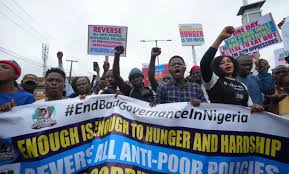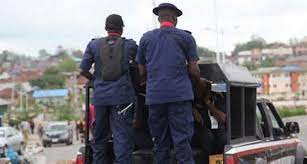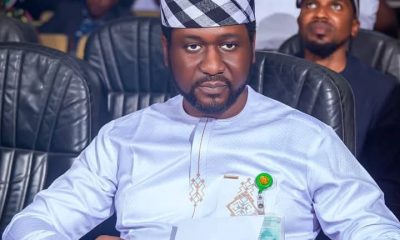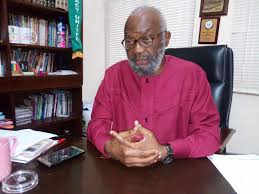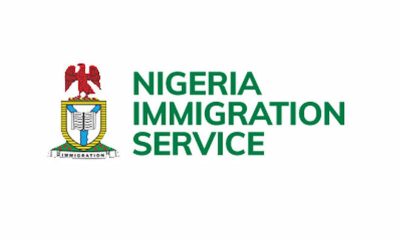Foreign News
Sri Lanka Prepares for President to Step Down while Protests Continue

Sri Lanka is preparing for the exit of President Gotabaya Rajapaksa, who is set to step down early after failing to address an unprecedented economic crisis leading to fuel, gas, medicine, and food shortages.
Rajapaksa is scheduled to resign from his post on Wednesday.
Meanwhile protesters continue to occupy the president’s official residence and his office and the prime minister’s official residence after storming the buildings on Saturday.
Lawmakers in the capital are discussing the election of a new president, to be decided in a vote on July 20.
They have also planned celebrations to mark the departure of Rajapaksa.
It may be the end of an era for the island nation.
President Rajapaksa’s elder brother Mahinda Rajapaksa was the country’s prime minister until he resigned in May, while their younger brother Basil Rajapaksa quit on June 9.
Basil Rajapaksa, an influential former Cabinet minister, was prevented from leaving the country on Tuesday, after fellow passengers at the airport intervened.
Basil Rajapaksa arrived at Colombo’s international airport on Tuesday morning, but was prevented from boarding his flight as passengers protested.
After the protests, immigration officials on duty said they were halting their work at the VIP lounge.
“We have also decided to keep away from duties at the VIP lounge as more politicians and their families will try to leave the country,” president of the Immigration and Emigration Officers’ Association, K A A S Kanugala, told dpa.
He also said there had been reports that President Gotabaya Rajapaksa was trying to leave the country from the same airport, but added that his team had no knowledge of such attempt.
Meanwhile, protesters and trade unions have threatened to keep protesting until their demand for Prime Minister Ranil Wickremesinghe to step down is met.
“We will call for strikes and protests campaigns if the prime minister too does not resign,” said opposition activist Wasantha Samarasinghe.
The premier, whose private residence was burned down last Saturday, has expressed his willingness to step down, but has not given a specific date.
However, he is now likely to stand as a candidate for the post of president in the July 20 elections, as he is supported by some of the members of the ruling party in parliament.
Wickremesinghe was chosen by Rajapaksa to become prime minister when the previous holder of the post resigned on May 9, so he is seen as an ally of the outgoing president.
Wickremesinghe is the sole member from his United National Party in the 225-seat parliament, but has the support of Rajapaksa’s Sri Lanka People’s Party.
Protests against the president and the government have been escalating for the past three months due to an unprecedented economic crisis which has sparked fuel, medicine and food shortages.
Sri Lanka has sought support from the International Monetary Fund (IMF) for a bailout package, but the IMF is demanding political stability as a prerequisite.
The country received the first stocks of domestic gas supplies in a month over the weekend.
Meanwhile a shipment of fertiliser arrived on Monday, after shortages for more than three months.
However, long queues formed again outside fuel station, with only limited supplies available from the Indian Oil Company, while government-controlled filling stations remain closed for two weeks. (NAN)
Foreign News
US Senators Exempt HIV/Aids Funding from Planned Spending Cuts

Republicans in the US Senate have said they will spare the US-backed HIV/Aids programme Pepfar from cuts, amid a larger effort to reduce government spending.
Senators said they would end a plan to cut $400m (£300m) from the President’s Emergency Plan for Aids Relief programme, leaving total proposed cuts at $9bn.
The proposition was made in a Senate amendment to a rescissions package – meaning a bill that allows lawmakers to cancel previous funding approved by Congress.
The planned cancellations also include funds for international aid and public broadcasting.If the Pepfar amendment is approved, the bill will go back to the House of Representatives for another vote ahead of a Friday deadline.
Multiple senators from both parties had expressed concern with cuts to Pepfar, which was launched under President George W Bush and has been credited with saving tens of millions of lives around the world.
The Republican-controlled Senate can only afford a few defectors, assuming all Democrats vote in opposition. John Thune, the Republican Senate majority leader, said there had been a “lot of interest” in keeping the Pepfar funding intact.
Senator Susan Collins, a Republican from Maine, told reporters after a White House lunch on Tuesday that she was “very pleased” that the cuts would be removed.
Prior to the amendment, Collins had been vocal against the bill. She has not said whether the changes are enough to secure her support.
Office of Management and Budget (OMB) Director Russell Vought told reporters that the White House was on board with the Senate amendment, meaning that in its current form President Donald Trump would be willing to sign it.
In his second presidency, Trump has turbo-charged an effort to reduce government spending. Most of the cuts in the rescission bill are aimed at clawing back money that was previously earmarked for the American government’s main humanitarian assistance body, USAID, which recently announced its formal closure under Trump.
Trump’s moves have led to drastic reductions in HIV/Aids clinics in South Africa and other countries, precipitating a shortage of life-saving medicine and care.
Other cuts in the rescission bill are aimed at the funding for public broadcasters NPR and PBS.
Foreign News
WHO Commends Senegal for Eliminating Trachoma

The World Health Organization (WHO) has validated Senegal’s elimination of trachoma as a public health problem, making it the ninth country in WHO’s African Region to have achieved the feat.
WHO Director-General Tedros Ghebreyesus, in a statement, lauded the country for freeing its population of the disease.
“This milestone is yet another sign of the remarkable progress being made against neglected tropical diseases globally, and offers hope to other countries still working to eliminate trachoma.
”Trachoma has been known in Senegal since the early 1900s and was confirmed as a major cause of blindness through surveys in the 1980s and 1990s.
Senegal joined the WHO Alliance for the Global Elimination of Trachoma in 1998, conducted its first national survey in 2000, and completed full disease mapping by 2017 with support from the Global Trachoma Mapping Project and Tropical Data.
Trachoma control was consistently integrated into national eye health programmes – first under the National Programme for Blindness Prevention (PNLC) and later through the National Programme for the Promotion of Eye Health (PNPSO).
The country’s consistent integration of trachoma control into its national eye health programmes positioned it to significantly maintain its commitment to the elimination of the disease.
“Today we celebrate our victory against trachoma, 21 years after the one against dracunculiasis”, Dr Ibrahima Sy, Senegal’s Minister of Health and Social Action, said.
“This new milestone reminds us that our overarching goal remains a Senegal free from neglected tropical diseases.
“We are fully committed to this, and we are making good progress, notably against human African trypanosomiasis (sleeping sickness) and onchocerciasis”.
Senegal implemented the WHO-recommended SAFE strategy to eliminate trachoma with the support of partners, reaching 2.8 million people who needed them across 24 districts.
These activities included the provision of surgery to treat the late blinding stage of the disease and conducting antibiotic mass drug administration of azithromycin donated by Pfizer through the International Trachoma Initiative.
Similarly, public awareness campaigns were carried out to promote facial cleanliness and improvement in access to water supply and sanitation.
Trachoma is the second neglected tropical disease to be eliminated in Senegal. In 2004, the country was certified free of dracunculiasis (Guinea-worm disease) transmission.
Senegal now joins 24 other countries that have been validated by WHO for eliminating trachoma.
The 24 countries are Benin, Burundi, Cambodia, China, Gambia, Islamic Republic of Iran, Lao People’s Democratic Republic, Ghana, India, Iraq, Malawi, and Mali.
The others are Mauritania, Mexico, Morocco, Myanmar, Nepal, Oman, Pakistan, Papua New Guinea, Saudi Arabia, Togo, Vanuatu, and Vietnam.
These countries are part of a wider group of 57 countries that have eliminated one or more neglected tropical diseases.
WHO is supporting Senegal’s health authorities to closely monitor communities in which trachoma was previously endemic, to ensure there is no resurgence of the disease.
“Trachoma has cast a shadow over communities in Senegal for more than a century.
“This long-awaited validation is not only a milestone for public health but a powerful tribute to the tireless dedication of frontline health workers, communities, government leaders, and partners who never gave up,” Dr. Jean-Marie Vianny Yameogo, WHO Representative in Senegal, said.
“Today, we close a chapter that began over a hundred years ago, united with pride, gratitude and resolve. WHO remains committed to supporting Senegal as the country continues to lead in sustaining this hard-earned achievement.”
Trachoma remains a public health problem in 32 countries, with an estimated 103 million people living in areas requiring interventions against the disease.
Trachoma is found mainly in the poorest and most rural areas of Africa, Central and South America, Asia, the Western Pacific and the Middle East.
WHO’s African Region is disproportionately affected by trachoma, with 93 million people living in at-risk areas in April 2024, representing 90% of the global trachoma burden.
Significant progress has been made in the fight against trachoma over the past few years, and the number of people requiring antibiotic treatment for trachoma in the African Region fell by 96 million from 189 million in 2014 to 93 million as of April 2024, representing a 51 percent reduction.
There are currently 20 countries in WHO’s African Region that are known to require intervention for trachoma elimination.
They are Algeria, Angola, Burkina Faso, Cameroon, Central Africa Republic, Chad, Côte d’Ivoire, Democratic Republic of the Congo, Eritrea, Ethiopia, and Guinea.
The others are Kenya, Mozambique, Niger, Nigeria, South Sudan, the United Republic of Tanzania, Uganda, Zambia, and Zimbabwe.
A further 3 countries in the Region (Botswana, Guinea-Bissau and Namibia) claim to have achieved the prevalence targets for elimination.
Foreign News
Israel Bombs Syrian Forces Entering Druze City after Sectarian Clashes

Torough David, Abuja
Israel says it has bombed Syrian government forces around Suweida, as they entered the predominantly Druze city following two days of deadly sectarian clashes.
About 100 people have reportedly been killed since the fighting between Druze militias and Bedouin tribes erupted on Sunday.
Syria’s defence minister announced a ceasefire in Suweida on Tuesday morning, saying an agreement had been reached with local dignitaries for security forces to deploy there.
However, one Druze spiritual leader urged local fighters to resist.Later, Israel’s prime minister said he had ordered strikes on forces and weapons in the Suweida area because the government “intended to use [them] against the Druze”.
Benjamin Netanyahu said he was committed to preventing harm to the Druze in Syria because of their deep ties to those living in Israel and the Israeli-occupied Golan Heights.
This is the first time that Syrian government forces have been deployed to Suweida since Islamist-led rebels overthrew President Bashar al-Assad in December.
Minority communities are suspicious of interim President Ahmed al-Sharaa’s government despite his pledges to protect them, and until now the province of Suweida had remained largely under the control of Druze militias which resisted calls to join the security forces.
The fighting between Bedouin tribes and Druze militias in Suweida was reportedly sparked by the robbery and abduction of a Druze merchant on the highway to Damascus last Friday.
On Sunday, armed Druze fighters reportedly encircled and later seized the city’s al-Maqwas neighbourhood, which is inhabited by Bedouin.
The clashes soon spread into other parts of Suweida province, with tribesmen reportedly launching attacks on Druze towns and villages on the city’s outskirts.
As the death toll reached 30, Syria’s interior ministry announced that its forces and those of the defence ministry would intervene and impose order, saying the “dangerous escalation comes in light of the absence of relevant official institutions”.
There was a brief period of calm on Sunday night, after mediation between Bedouin and Druze leaders resulted in the release of people kidnapped by both sides, according to activist-run news outlet Suwayda 24.
But on Monday, it said the fighting had resumed in the countryside west of the city after drones attacked villages at the same time as government forces deployed in nearby areas of eastern Deraa province.
Later, Suwayda 24 reported that villages in the area were also hit by mortar fire and that dozens of dead and wounded had been brought to local hospitals.
Meanwhile, the Israeli military said it had struck several government tanks to prevent them advancing towards Suweida city. Israeli Defence Minister Israel Katz said the strikes were a “clear warning to the Syrian regime”.
On Monday evening, the Syrian Observatory for Human Rights, a UK-based monitoring group, reported that 99 people had been killed, including 60 Druze, including four civilians, 18 Bedouin fighters, 14 security forces personnel.
The defence ministry said 18 security personnel had been killed during attacks on military points by what it called “outlaw groups”.
On Tuesday morning, the Druze spiritual leadership said they had agreed to allow government forces to enter Suweida province in order to end the bloodshed. They also called on all armed groups there to co-operate and hand over their weapons.
But hours later, influential Druze Sheikh Hikmat al-Hajri posted a video calling on Druze fighters to “resis[t] this brutal campaign by all available means”, accusing government forces of bombarding Suweida city in violation of a ceasefire agreement.
As security forces entered the city, Defence Minister Maj Gen Murhaf Abu Qasra announced a “complete ceasefire”, saying an agreement had been reached with “notables and dignitaries”.
“Suweida neighbourhoods will be under the control of Internal Security Forces as soon as combing operations are completed in order to control the chaos, secure return of residents to their houses,” he added.
Early on Tuesday afternoon, Israeli Prime Minister Benjamin Netanyahu and Defence Minister Israel Katz said they had directed the Israeli military to immediately attack Syrian forces and weaponry sent to the Suweida area “that the regime intended to use against the Druze”.
They accused the Syrian government of contravening “the demilitarisation policy they decided on” and of endangering Israel by deploying forces there.
“Israel is committed to preventing harm being inflicted on the Druze in Syria, owing to the deep covenant of blood with our Druze citizens in Israel and their historical and familial link to the Druze in Syria,” they added.
The Syrian Observatory shared a video that it said showed at least one member of the security forces who was killed in an Israeli strike on a convoy.
There was no immediate response from the Syrian government.
Earlier this year, Netanyahu warned that he would not “tolerate any threat” to Syria’s Druze and demanded the complete demilitarisation of Suweida and two other southern provinces,
He said Israel saw interim President Sharaa’s Sunni Islamist group, Hayat Tahrir al-Sham (HTS), as a threat. HTS is a former al-Qaeda affiliate that is still designated as a terrorist organisation by the UN and UK, but no longer the US.
The Israeli military has already carried out hundreds of strikes across Syria to destroy the country’s military assets since the fall of the Assad regime.
And it has sent troops into the UN-monitored demilitarised buffer zone between the occupied Golan Heights and Syria, as well as several adjoining areas and the summit of Mount Hermon.



